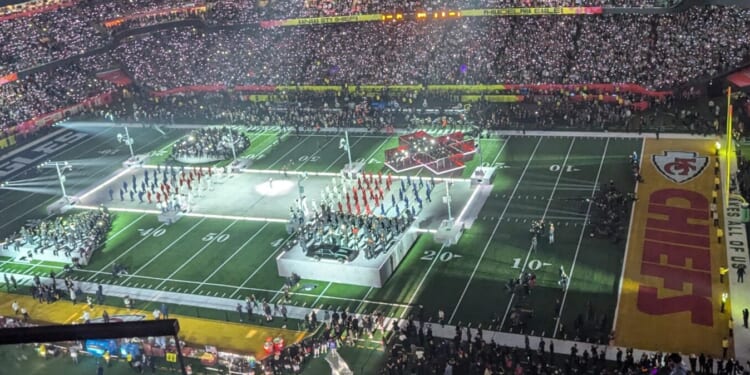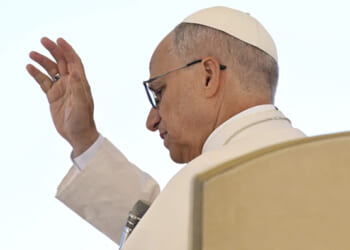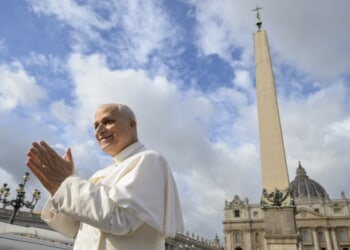Every year, millions of Americans gather around their televisions for what has become our nation’s largest shared sports liturgy: the Super Bowl. The commercials, the halftime show, the extravagant pregame spectacles, and—oh yes—the football itself, are woven together into an event that is at once entertainment and tradition. This year will be no exception.
The National Football League has announced that Bad Bunny, the Puerto Rican reggaeton star, will headline the halftime show. Immediately, controversy erupted: critics protested his use of drag imagery, his lyrics laden with sexual bravado, and his prior remarks about not wanting to perform in the United States due to political climate and immigration enforcement concerns.
Catholics—indeed, all Christians—should pay attention here. But not in the way we often do. The real problem is not simply that Bad Bunny’s music and persona clash with Christian moral teaching. The deeper problem is that we continue to expect the NFL, and the Super Bowl in particular, to uphold or validate our Christian values and morality in the first place. It is time we recognized the halftime show for what it is: not a neutral cultural celebration, but a stage carefully curated to serve the interests of corporate sponsors, advertisers, and entertainment executives. Expecting holiness or even moral neutrality from such a stage is naïve at best.
The Halftime Show as Cultural Weather Vane
The Super Bowl of decades ago was about gathering with family and friends, and for many it still is, albeit, it looks more like civic religion than anything else. The Super Bowl halftime show has never been about upholding Christian values, at least not since Janet Jackson and Justin Timberlake’s infamous “wardrobe malfunction,” to Madonna’s faux-liturgical theatrics, to last year’s lineup of performers whose lyrics glorified vice, the pattern is clear: the halftime show now reflects the dominant currents of pop culture, not eternal truths.
Bad Bunny fits perfectly into this mold. His music—catchy as it may be—is saturated with themes of lust, power, and indulgence. His appearance in drag for a music video became one of his signatures, a deliberate play on gender-bending aesthetics. This does not make him unusual in today’s entertainment landscape; it makes him predictable. His selection reflects what the NFL believes will bring the largest international audience and the most media attention.
Catholics should not be scandalized as though this is some shocking new development. The halftime stage was never intended to form virtue. It has always been a showcase of whatever is most profitable, provocative, and popular.
The NFL’s Interests Are Not Yours
I’m not saying the concerns of many are misplaced, but one reason the backlash against Bad Bunny feels perhaps miscast, is that it assumes the NFL has some obligation to uphold a certain cultural or moral standard. But why would they? The NFL’s goals are clear: maximize revenue, grow international audiences, and keep their product culturally central. The only one to be shocked is whomever has not been paying attention for the last several years to the moral decline of our culture.
Bad Bunny, with his immense global following and crossover appeal, is a business decision. That he previously said he did not want to perform in America due to politics is irrelevant to them. The NFL is not in the business of guarding national honor or protecting family values. They are in the business of making money. If they bring out some soldiers to raise the American flag, it wasn’t for patriotism: it was a business decision. Get the point?
From that standpoint, Bad Bunny is a near-perfect choice: he brings international attention, guarantees social media buzz, and keeps the halftime show controversial enough to stay relevant without risking true cancellation. The league is not betraying its supposed morals by choosing him; it has no morals beyond the balance sheet.
A Brief Historical Reminder
We sometimes forget that the NFL itself has always had a complicated relationship with morality. The very nature of the game is to be extremely competitive, high stakes, and incredibly violent in nature. The modern Super Bowl, though bloodless compared to gladiatorial combat of millennia ago, plays a similar cultural role. It is the most watched event of the year, a unifying moment in American life, but it also serves as a mirror of the culture’s our values. And what does it reflect? Hyper-commercialization, sexual provocation, nationalism mixed with consumerism, and endless distractions. To expect it to carry a message of chastity, humility, or sanctity is to misunderstand its nature.
This is not to say football itself is evil. I’m a Packers fan, myself. (Quick obligatory “Go Pack Go!”) Athletic competition can honor discipline, teamwork, and perseverance. But the spectacle of the Super Bowl—especially the halftime show—has never been about those virtues.
Why Catholics Should Stop Expecting Validation
This brings us to the heart of the matter. Too often, Christians treat the halftime show as a referendum on culture. If the performer is scandalous, we react with outrage. If the performer is relatively tame, we breathe a sigh of relief. But in both cases, we are still letting the NFL define the terms.
Our faith does not need the validation of a halftime show. Christ is Lord, whether or not the NFL recognizes Him. The Church’s teaching on human sexuality, dignity, and worship is true, regardless of whether a pop star mocks it, ignores it, or inadvertently echoes it. The danger is not that Bad Bunny will corrupt Catholic truth, but that Catholics will keep turning to the NFL for cultural reassurance rather than standing firm in Christ.
How Then Should We Live?
So what should Catholics do?
First, we should recognize what the Super Bowl halftime show is: a performance designed to provoke, entertain, and sell. It is not for us. Really, it never has been. If you know the performance will offend your conscience, turn it off. Watch the game, enjoy the competition, but mute the spectacle. There is no obligation to consume every aspect of popular culture. And no, you are not committing proximate sin or anything of that sort simply by watching the sport.
Second, we should stop treating outrage as a form of witness. Public handwringing over the performer only feeds the publicity machine. When we act scandalized year after year, we show that we still expect the NFL to provide moral clarity. It never will. Better to respond with indifference: “Of course the world acts like the world. Why would I expect otherwise?” That calm confidence is a more powerful witness than perpetual shock.
Third, we should build our own culture. Catholics have always thrived when we stop begging secular institutions for scraps of affirmation and instead create beauty, music, ritual, and celebration rooted in truth. Rather than lament Bad Bunny’s lyrics, why not support Catholic musicians, artists, and storytellers? Rather than hope the halftime show uplifts our children, why not cultivate family traditions that do so regardless of what the television broadcasts?
The Bottom Line
The controversy over Bad Bunny’s Super Bowl performance is just the latest reminder: the NFL is not your pastor. The halftime show is not a catechism. It is a corporate spectacle designed to sell advertising and entertain the masses. Catholics do not need to fear it—but neither should we expect it to uplift us.
As our Lord said, “If the world hates you, know that it has hated Me before it hated you” (Jn. 15:18). The world will not hand us validation in its biggest arenas. That is not a reason to despair. It is a reason to rejoice, because our faith does not rest on the approval of the NFL, the halftime show, or any celebrity. It rests on Christ crucified and risen.
So this Super Bowl Sunday, enjoy the game if you like. Skip the halftime show if your conscience demands it. But stop expecting the world’s biggest secular spectacle to mirror the morality of the Gospel. That is not its job. It never was. And the sooner we stop demanding it, the freer we will be to live, work, and celebrate as Catholics in a world that desperately needs—not a sanitized halftime show—but the saving truth of Jesus Christ.
Image from Wikimedia Commons











